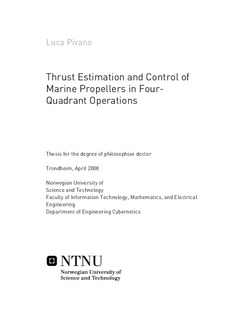Thrust Estimation and Control of Marine propellers in Four-quadrant Operations
Doctoral thesis
Permanent lenke
http://hdl.handle.net/11250/259432Utgivelsesdato
2008Metadata
Vis full innførselSamlinger
Sammendrag
Speed and position control systems for marine vehicles have been subject to an increased focus with respect to performance and safety. An example is represented by drilling operations performed with semi submersible rigs where the control of position and heading requires high accuracy. Drifting from the well position could cause severe damage to equipment and environment. Also, the use of underwater vehicles for deep ocean survey, exploration, bathymetric mapping and reconnaissance missions, has become lately more widespread. The employment of such vehicles in complex missions requires high precision and maneuverability.
This thesis focuses on thrust estimation and control of marine propellers with particular attention to four-quadrant operations, in which the propeller shaft speed and the propeller inflow velocity (advance speed) assume values in the whole plane. In the overall control system, propellers play a fundamental role since they are the main force producing devices. The primary objective of the thruster controller is to obtain the desired thrust from the propeller regardless the environmental state. During operations, propellers are often a¤ected by thrust losses due to e.g. changes in the in-line water velocity, cross flows, ventilation, in-and-out of water effects, wave-induced water velocities, interaction between the vessel hull and the propeller and between propellers. Propellers may thus work far from ideal conditions. Therefore, the knowledge of the propeller thrust and torque, together with forces induced by the interaction between the vehicle and propellers and between propellers, is fundamental to achieve high control performance. Unfortunately a propeller system is usually not equipped with thrust and torque sensors, therefore thrust losses are not directly measured.
Motivated by this, a new four-quadrant thrust estimation scheme is presented, extending previous results valid for propeller operating in two quadrants. Based on shaft speed and motor torque measurements, the scheme involves a nonlinear observer for the propeller torque that shows stability and robustness for bounded modeling and measurement errors. The propeller thrust is computed as a static function of the propeller torque. The performance is demonstrated in experimental tests, showing improved accuracy in the thrust reproduction with respect to the direct use of the four-quadrant propeller characteristics.
A nonlinear observer for the torque loss estimation, similar to the one implemented in the thrust estimation scheme, is included in a new fourquadrant nonlinear thrust controller, designed for calm and moderate sea conditions. The control strategy is based on a shaft speed controller where the desired velocity is computed from the desired propeller thrust and on the torque losses. Experimental results are provided, demonstrating the e¤ectiveness of the new controller with respect to the conventional shaft speed and torque controllers.
The thrust controller, designed for calm and moderate sea conditions, is subsequently improved by including an anti-spin strategy to reduce power peaks and wear-and-tear in extreme sea conditions. The anti-spin strategy is derived from previous works that were designed for Dynamics Positioning (DP) operations. The presented controller can operate also for maneuvering and transit operations, where the vehicle speed is larger than in DP operations. The performance of the controller is validated by experimental tests.
Motivated by environmental issues and the need of reduced fuel consumption and CO2 emissions, a novel control scheme for improving, in moderate sea, the propulsion e¢ ciency with respect to conventional propeller controllers is presented. The main idea is to exploit the variation in the advance speed due to waves to increase the average propulsion efficiency without reducing the vessel speed. A nonlinear controller is proposed showing that, theoretically, is possible to increase the propulsion efficiency. Model tests determine dynamic characteristics of propellers in waves and a simulation is employed to validate the novel control scheme.
